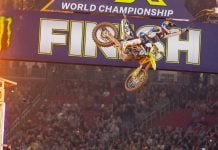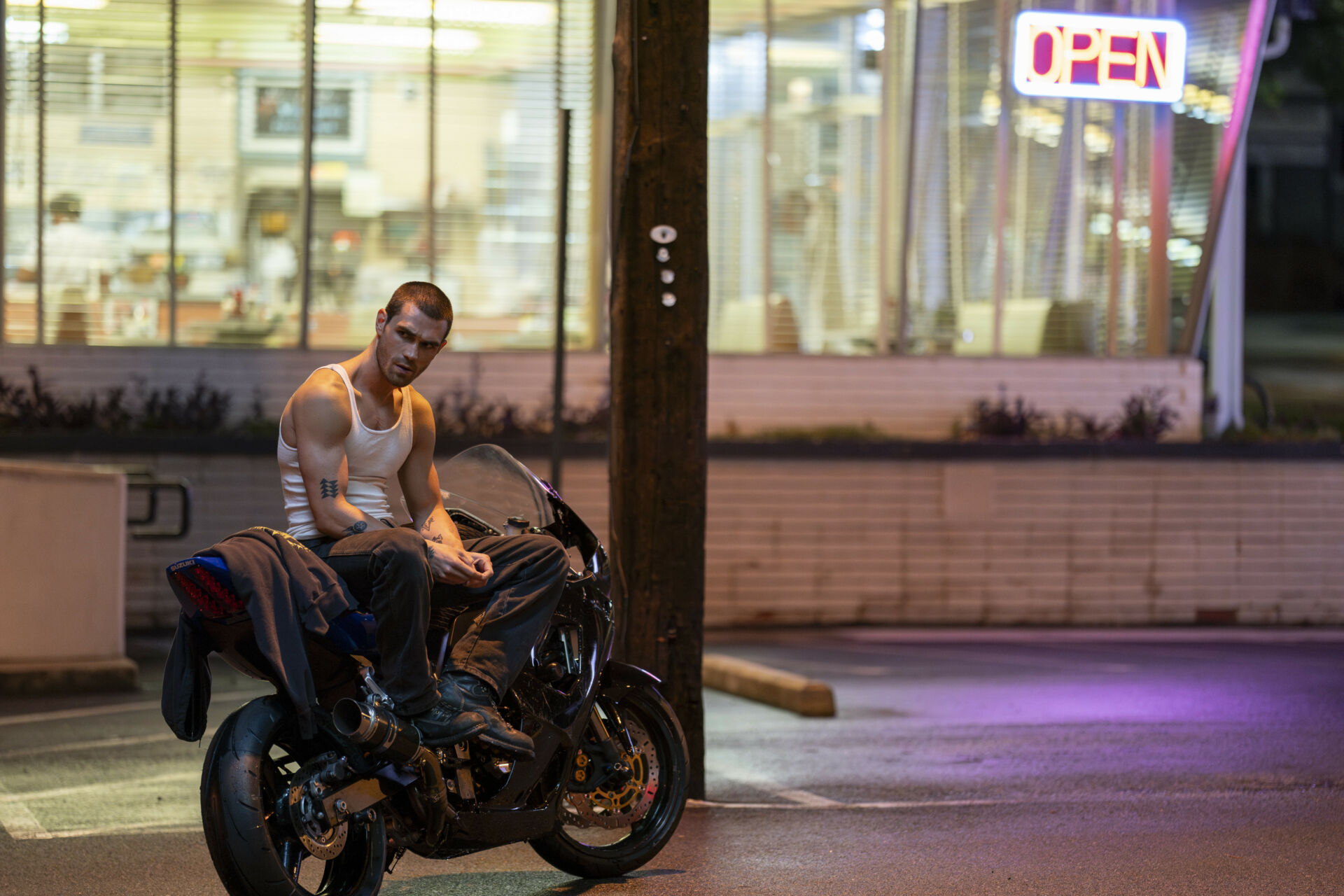First Person/Opinion:
By Michael Gougis
The Amazon MGP Studios film “One Fast Move” is not a story about motorcycle road racing. Ironically, that frees the creators to make a movie where the parts about motorcycle road racing are about as realistic as it gets in the world of fictionalized narratives. The “racing” in the movie is just background for the storyline, but“One Fast Move” gets more right about racing than it gets wrong.
“One Fast Move” — a partial quote from beat author Jack Kerouac — is a movie about father-son relationships, about abandonment, pain, redemption, definitions of masculinity and hope. The movie explores those themes through events that happen in the world of club racing, on and off the track.
Director Kelly Blatz, a self-described motorcycle addict and road racing fan, says his team went to great lengths to make sure the on-track footage looked authentic. A fan of classic racing movies like “Grand Prix” with James Garner, Blatz sought top-level talent and brought on renowned Hollywood motorcycle action coordinator (a past AMA National race winner) Greg Smrz. The production team hired current racers — including two-time Daytona 200 winner Brandon Paasch, who now races a Vision Wheel M4 ECSTAR Suzuki GSX-R1000R in MotoAmerica Superbike. They brought on motojournalist and former racer Zach Courts as a consultant. Hanging out at club races at Willow Springs International Raceway and Buttonwillow Raceway Park gave Blatz a first-hand look at what club racing looks like. And creating the equipment to capture the on-track action was key as well, Blatz says.
“We realized that the way to capture speed was by putting a camera on a racebike,” Blatz said. “We developed (movie camera) rigs for a racebike — I believe it was a Yamaha YZF-R1. We built a custom race car … and we also used a helicopter because a drone won’t keep up with a racebike.”
The result is footage from Atlanta Motor Speedway and Road Atlanta that looks somewhat realistic to anyone who has spent time at a club race. Part of the authenticity came from capturing racers in unscripted mock race action on the track, although reigning in their competitive urges and getting them to follow the script proved to be a challenge at times.
“We’d say, ‘I know you want to win, but at a certain point you’re going to have to allow this particular bike to pass you,’” Blatz says.
The atmosphere and the images from a club racing paddock are spot-on. Everyone works under a pop-up canopy — there is no row of tractor-trailers. The main character — Wes Neal, played by KJ Apa — starts his racing career on a Suzuki SV650. Having Neal, an overconfident former street racer, crash in his first practice session brings a smile. It was so refreshing to see club racers on the screen who actually had club racer money, or lack thereof. There are very few club racers who couldn’t relate to Apa’s bodged-together SV650 that he rides on the street after retiring it from track duty. A Frankenbike, indeed!
“I love the world of club racing. It’s mostly about passion. These racers are paying to race. I love that aspect,” Blatz says. “Hopefully, we captured something as authentic as possible.”
Best to think of the racing in this movie as a vehicle for exploring the other themes that caught Blatz’s imagination. A review of the sports car movie “Le Mans” with Steve McQueen included a line that has stuck with me for years. “This is a movie about flawed humans doing remarkable things,” the reviewer said, or words to that effect, and that applies here.
Each of the characters, including Neal; his drunken, womanizing father, played by Eric Dane; and the father’s mentor, played by Edward James Olmos; is deeply damaged by their relationships, or lack thereof, with their fathers. Watching the characters coming to terms with their issues, changing their behavior, refusing to accept their flaws or doing an imperfect job of trying to right their past wrongs are the memories that resurfaced for me days after watching the movie. Setting those deep, emotional conflicts against the world of racing, where feelings don’t matter but lap times do, lends a depth to the movie that so many other racing films just completely lack. For example, by the end of “Driven” with Sylvester Stallone, the only checkered flag I cared about was the one that signaled the merciful end of the movie.
“I had these questions about what it means to be a man in the modern world,” Blatz says. “I had these questions about fathers and sons and absentee fathers. And I felt like the two worlds really lent themselves to each other.”
No one winds up with a MotoGP contract at the end of “One Fast Move.” The main character still lives at home at the end of the movie, and it’s not a palace. It’s club racing, and Blatz wanted to give the viewer a taste of a sport that he clearly cares for. “One Fast Move” hits more often than it misses.
“I wanted to introduce people to the world of motorcycle road racing,” Blatz says. “I wanted them to get a sense of what it feels like.”







